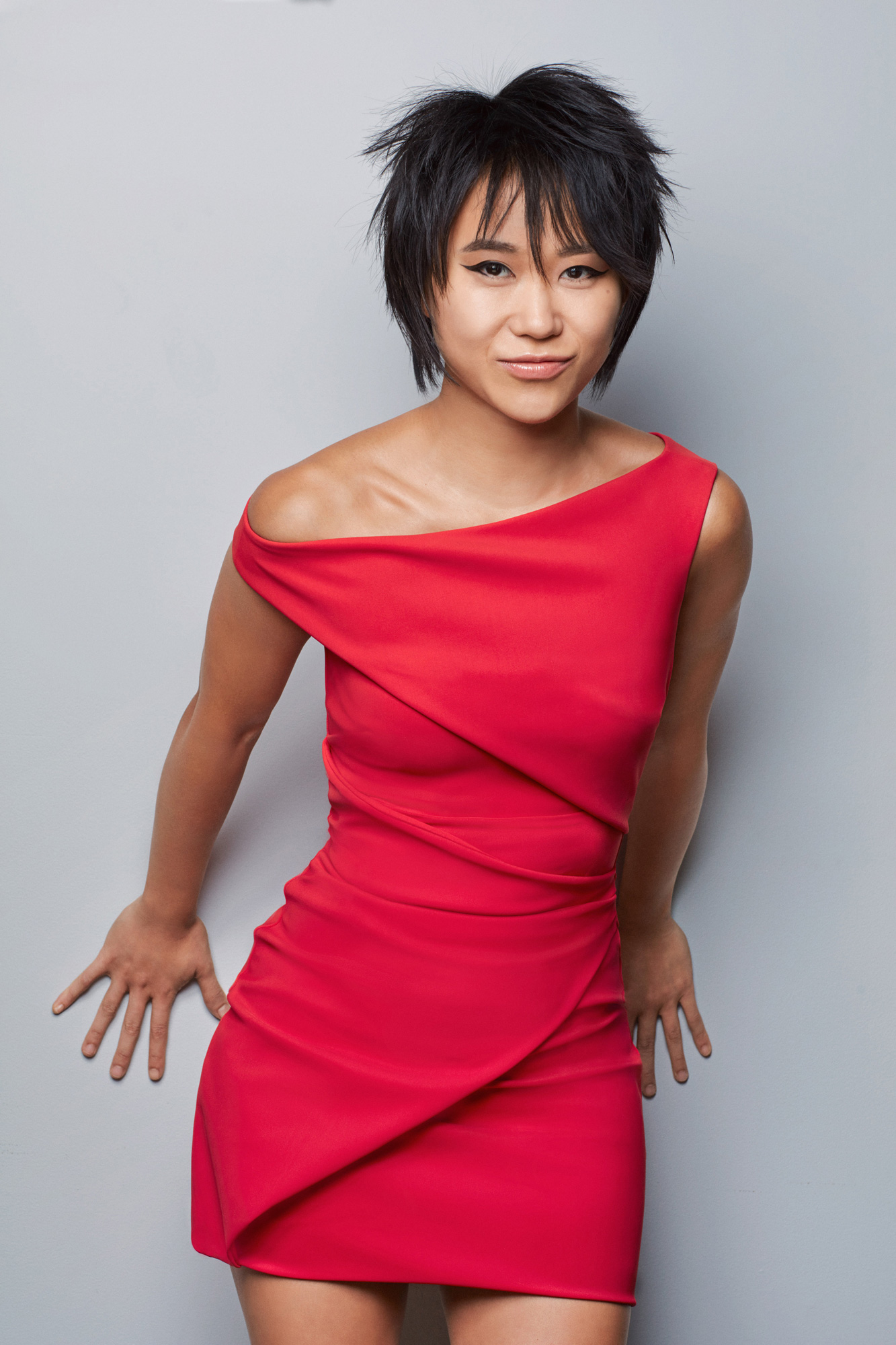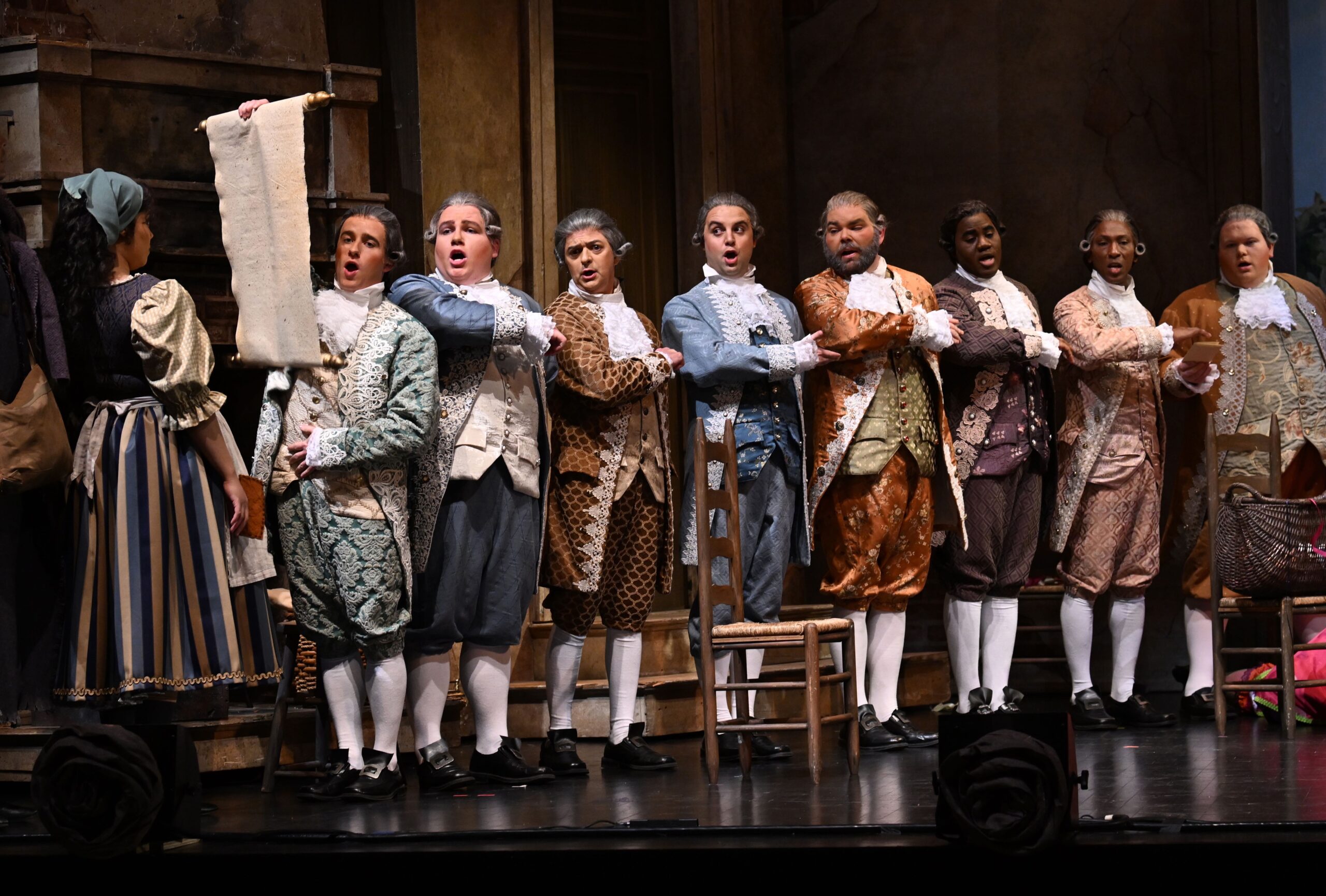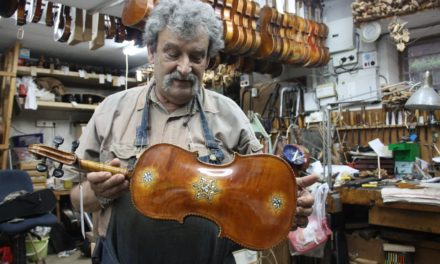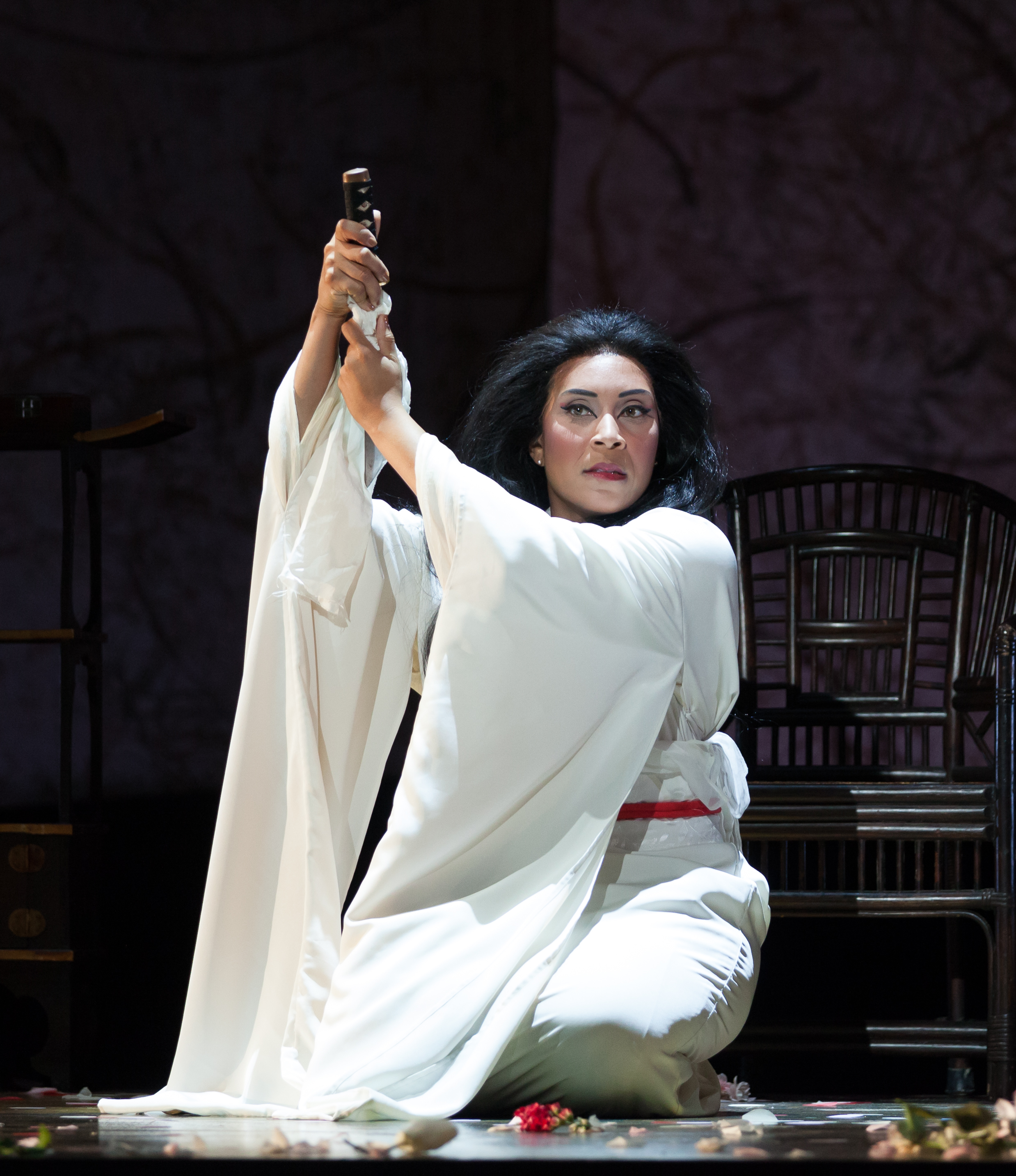Pianist Yuja Wang. Photo by Kirk Edwards.
Yuja Wang Plays Rachmaninoff
Louisville Orchestra
Teddy Abrams, conductor
Yuja Wang, piano
Review by Annette Skaggs
Entire contents copyright © 2017 Annette Skaggs, All rights reserved.
As the house lights dimmed the familiar rata-tat-tat on the snare drum signaled the beginning of our nation’s anthem, the “Star Spangled Banner” as the audience rose to their collective feet and sang along. Thus, this long held tradition began the Louisville Orchestra’s 80th Classics Season.
Our Louisville Orchestra has many, many reasons to be excited about celebrating such a milestone, such as the release of a new CD titled “All In” featuring works by Cole Porter, Aaron Copeland, Storm Large and Teddy Abrams. I have several Louisville Orchestra albums at home, some of them quite scratched up from continued play, so I look forward to listening to what this new recording has to offer. As Maestro Abrams noted before the beginning of the second half of the evening, it would be wonderful to see “All In” at the #1 spot on iTunes’ Classical list. If you are wondering how to get your own copy, feel free to go to www.louisvilleorchestra.org.
But we are here to discuss live orchestral music, so let’s dig in.
When I was in school studying music, both on the undergrad and graduate level, there was a certain reverence that I gave to those students that mastered composition and music theory. I could sing the notes and compose lyrics all day long, but to actually put those lyrics to a written melody, well, that’s when I’d pull my hair out.
In Saturday night’s season opener, Louisville Orchestra pianist Sebastian Chang transposed, for the whole orchestra, an improvisational organ piece written by Dr. Ford Lallerstedt, a professor of Musical Studies at the prestigious Curtis Institute of Music, Maestro Abrams’ alma mater. Titled Mumbo! Jumbo!, the piece has stylings that remind me of what we consider to be “classical” mixed in with some jazz-like vibes here and there. An up-tempo and exciting piece to be sure and I greatly appreciate that we have someone like Mr. Chang who can take a piece written for an incredibly difficult instrument in its own right and reimagine it to be performed by an entire orchestra. Upon the last note Maestro Abrams invited Dr. Lallerstedt to the stage and, based upon the look that graced the esteemed professor’s face, I’d say that Mr. Chang’s work met with his approval. It certainly did with the nearly full Whitney Hall audience.
Chances are you are not as familiar with Sergei Rachmaninoff’s Piano Concerto No. 4 in G minor as it is not a commonly found in most orchestral repertoire, for reasons that of which I am not sure. Yes, it has a bit of Russian influence, but it also has moments, especially in the piano solos, that make one think of jazz influences. It is well known in musical history that Rachmaninoff was a lover of jazz. So, it would make sense that while he lived in the United States that he might be influenced by one of the few musical forms indigenous to our shores.
Maestro Abrams’ fellow Curtis Institute alumnus Yuja Wang graced our Whitney Hall stage in a lovely trained gown and some of the most nimble piano work I have ever seen on the grand piano. She sat straight and focused, listening intently to the music that swirled about and as soon as her lithe fingers touched the ebony and ivory I knew that we were in for some musical fireworks. To say that she came to play would be an understatement.
The first movement, Allegro vivace, while it does not have a thematic melody, does serve as a foundation for the other two movements to build from. Rachmaninoff is famous for a build up of tension and excitement, and just when you think the orchestration can’t be ramped up any further he turns the music on its side in what seems like a Nano-second to bring forth delicious and melodious moments. Just such an occurrence happened here, as the orchestra was building to a pitch and then a whisper later winds and brass paired with piano to bring forth a harmonious and satisfying resolve.
Largo, the second movement is where Ms. Wang showed the range of her prowess. Within this movement there were moments that it seemed that almost every sound from the solo piano was both written and improvisational. I firmly believe that within this small scope of time all 88 keys were used. Her reach of octaves and quick passagework made for wide-eyed viewing if you were lucky enough to clearly see her keyboard.
With virtually no break, the third movement, also Allegro vivace, provided a catalyst for Ms. Wang to show even more virtuosity with scintillating runs and a bombastic conclusion.
The Louisville Orchestra audience erupted in a huge and boisterous huzzah and gave Ms. Wang three curtain calls. Lucky for us, Ms. Wang was not finished and treated us to not one, but two encores. The first encore had everyone giggling as she began the often heard Rondo alla Turka (Turkish March) by Mozart. But, she brought forth a version that creates a whole new way of listening and interpreting this mainstay of Classical music. Her second, Variations on the Theme of Bizet’s Carmen, was re-imagined by another outstanding pianist, Vladimir Horowitz.
After witnessing Ms. Wang’s ability and following Maestro Abrams’ history making career I have a renewed faith that Classical music is indeed still relevant and necessary in our society.
To round out the evening we were treated to another Russian, Pyotr Ilyich Tchaikovsky and his Symphony No. 5 in E Minor, Op. 64. The first movement, Andante – Allegro con anima, rests mostly in a minor key and is dark, somber and brooding. There were times that the strings, mostly violins, seemed to be a bit overpowering, but Maestro Abrams was quick to correct. As the first movement comes to a close there are some moments that are light and furtive from the brass and winds.
The second movement, Andante cantabile, con alcuna licenza, begins with one of the most notable horn solos in the instrument’s repertoire. Principle Jon Gustely absolutely nailed it. But not to be outdone, the echoes from the oboes and bassoons were just as nice.
Just as its title, Valse, Allegro moderato suggests, the third movement begins as a waltz. Now, this is Tchaikovsky, so there is some change afoot and while you are ready to glide across the dance floor in 3/4ths time, the violins start to change tempo, creating a scherzo. No fears, it is but for a short time and we are resolved into a waltz once more, flowing effortlessly into the fourth and final movement, Finale Andante maestoso-Presto. With the movement in minor key with brief glimpses of major tonality it is a far cry from the melodic second movement and actually has a hard quality about it. But, despite its harsh edges, the Finale is memorably orchestrated.
As the end of the evening had descended upon us all and we were witness to some fantastic musicianship, the words that Maestro Abrams shared with us at the beginning of the concert echoed through my mind, if I may paraphrase, “Music is taken from an improvisational state and has the ability to transcend and break down all barriers.”
Yes indeed sir… yes indeed!!
Bravi Tutti!!!
Yuja Wang Plays Rachmaninoff
September 23, 2017
Louisville Orchestra
Kentucky Center for the Performing Arts
Whitney Hall
501 W. Main St
Louisville, KY 40202
louisvilleorchestra.org
Annette Skaggs is heavily involved as an Arts Advocate here in Louisville. She is a freelance professional opera singer who has performed throughout Europe and in St. Louis, Cincinnati, Boulder, Little Rock, Peoria, Chicago, New York and of course Louisville. Aside from her singing career, she has been a production assistant for Kentucky Opera, New York City Opera, and Northwestern University. Her knowledge and expertise have developed over the course of 25+ years’ experience in the classical arts.





